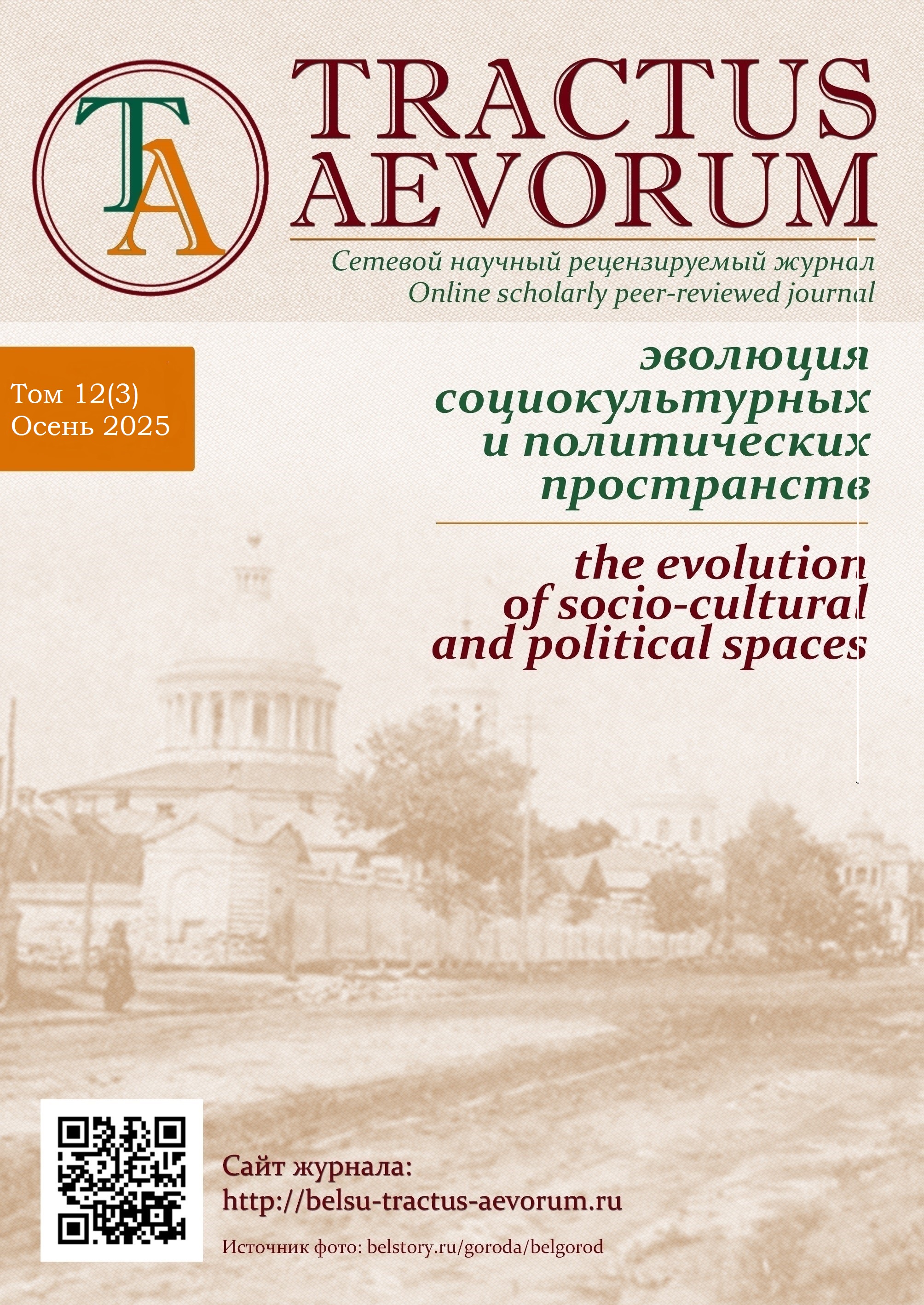|
WAR AND PEOPLE
|
The reasons and motives for supporting the Slavs in the Russian social movement of 1875-1878 through the prism of evidence from domestic sources of personal origin
|
  |
Original article
Evgeniy A. Suchalkin
Moscow City University
4 2nd Agricultural Selskokhozyaystvenny Drive, building 1, Moscow 129226, Russia
E-mail:
This e-mail address is being protected from spambots. You need JavaScript enabled to view it
Anton S. Pshegorsky
Voronezh State Technical University
84 20-Letiya Oktyabrya St., Voronezh 394006, Russia
E-mail:
This e-mail address is being protected from spambots. You need JavaScript enabled to view it
Abstract. The article examines the testimonies of Russian eyewitnesses to the Eastern Crisis of 1875 – 1878 about the causes and motives for Russian society of that time supporting the anti-Ottoman struggle of the Slavic peoples of the Balkan Peninsula. The author analyses diverse sources of personal origin, which can shed light on the rather complex problem of the essence of the attitude on the part of Russian society to the Balkan Slavs’ struggle at that time in history. The research source base is represented with the epistolary heritage, notes, memoirs, and diaries of Russian eyewitnesses to the events of the 1870s and early 1880s. The study reveals a wide range of possible reasons for supporting the Balkan Slavs, wherein awareness of the close kinship between the Slavic peoples in the Balkans and those in the Russian Empire was to a lesser extent responsible for that support.
Keywords: The Eastern crisis, the Russo-Turkish War of 1877-1878, testimony, participant, society, the Balkans.
DOI: 10.18413/2312-3044-2025-12-3-201-218
EDN: BTLHZE
|
"The Military Situation Imperatively Dictates...": Activities of the Kursk Region Authorities in Maintaining Roads on the Eve of and during the Battle of Kursk
|
  |
Original article
Yaroslav I. Ivanenko
Military History Research Institute of the RFAF General Staff Military Academy
47 Parkovaya st., Prokhorovka 309000, Belgorod region , Russia
E-mail:
This e-mail address is being protected from spambots. You need JavaScript enabled to view it
Abstract. Based on the analysis of archival documents, the article examines the activities of the Kursk re-gion government bodies (regional road department and district road departments) in maintaining the network of carriage roads and vehicle roads under their jurisdiction from February to August 1943. The author identifies problems and difficulties encountered by the Kursk Region authori-ties in maintaining and repairing existing roads, as well as in building new communication routes before and during the Battle of Kursk. The article also highlights the interaction between civilian authorities and military builders.
Keywords: The Great Patriotic War, the Battle of Kursk, Kursk region, the executive committee of the Kursk regional council of deputies, regional road department, district road departments, automobile and carriage roads.
DOI: 10.18413/2312-3044-2025-12-3-219-233
EDN: HPNKKY
|
The Principle of “Socialist/Revolutionary Legality” and its Role in the Governance of Rural Areas of the Kursk Region in the Last Years of the Great Patriotic War
|
  |
Original article
Oleg N. Argunov
State Archives of Kursk Region
57 Lenin st, Kursk, 305000, Russia
E-mail:
This e-mail address is being protected from spambots. You need JavaScript enabled to view it
Abstract. The Great Patriotic War and its end became the culmination of an emergency period of the domestic management system, which had begun at the time of the First World War. Throughout this period, the Soviet state evolved significantly, and immediately after the end of the war, the management system gradually began to gain stability, which was reflected in all aspects of society's life. Meanwhile, it inertially continued to use emergency management methods which were described as “socialist/revolutionary legality”. An analysis of historical sources shows that at the end of the Great Patriotic War, their role in local management was quite significant due to a combination of various subjective and objective factors. Although these methods allowed the system to be kept “in good shape”, their effectiveness quickly declined and it became necessary to develop new approaches to management that would be more adapted to peaceful construction.
Keywords: Kursk region, management system, rural district, district executive committee, district committee of the All-Union Communist Party (Bolsheviks), chairperson, first secretary, socialist/revolutionary legality.
DOI: 10.18413/2312-3044-2025-12-3-234-251
EDN: HYUICU
SOCIOLOGY OF HISTORY
|
Diagnostics of Historical Culture of Schoolchildren in the Orenburg Region: Analysis into Value Orientations and Historical Representations
|
  |
Original article
Sergey V. Lyubichankovskiy
Orenburg State Pedagogical University
19 Sovetskaya St., Orenburg 460014, Russia
E-mail:
This e-mail address is being protected from spambots. You need JavaScript enabled to view it
Abstract. The article presents the results of diagnosing the historical culture level in school pupils and students of secondary vocational education institutions in the Orenburg region. The analysis of the responses of 305 survey participants revealed the key features of the modern youth’s historical consciousness: the predominance of the statist-patriotic narrative, a complex but generally positive and constructive perception of controversial pages in history, as well as a pronounced regional identity based on the idea of intercultural dialogue. The study reveals the heterogeneity of historical representations and the dominance of the mindset of "learning lessons" from history, which indicates a rather high level of reflexivity.
Keywords: historical culture, historical consciousness, historical education, history identity, patriotism, Orenburg region, diagnostics, schoolchildren.
DOI: 10.18413/2312-3044-2025-12-3-252-265
EDN: MGWXMR
TRANSITIONAL EPOCHS
|
Way toward Cooperation and End to Illusions: the USSR and Kenya in it's Struggle for Independence
|
  |
Original article
Elena A. Gamora
Belgorod State National Research University
85 Pobedy St., Belgorod 308015, Russia
E-mail:
This e-mail address is being protected from spambots. You need JavaScript enabled to view it
Abstract. This article examines the Soviet approach to the Mau Mau movement in Kenya, from ideological rhetoric and media propaganda to diplomatic cooperation following Kenya's independence. The USSR supported the uprising as an anti-colonial struggle, promoted its stance on international platforms, and provided financial assistance to left-wing movements. After 1963, the Soviet Union developed cultural and educational ties with Kenya, though internal conflicts and the growing influence of pro-Western forces led to a deterioration of relations. By 1967, Kenya had firmly established its foreign policy alignment with the West, and Soviet support was discontinued.
Keywords: Mau Mau, USSR, Kenya, decolonization, diplomacy, Cold War, Soviet press.
DOI: 10.18413/2312-3044-2025-12-3-266-278
EDN: PVUZRK
DEPOSITORY
|
“Records of Demarcated Lands for the General Plan of the Volchansky District: Abstract from ‘The Economic Notes to the Plans of Dachas of the General Land Survey of 1765-1843'” (Publication of the Document)
|
  |
Publication of the document
Alexandr A. Pchelinov-Obrazumov
State Archive of the Belgorod region
14, Mokrousov st., Belgorod, 308024, Russia
E-mail:
This e-mail address is being protected from spambots. You need JavaScript enabled to view it
Nikolay N. Fomichev
State Archive of the Belgorod region
14, Mokrousov st., Belgorod, 308024, Russia
E-mail:
This e-mail address is being protected from spambots. You need JavaScript enabled to view it
Abstract. “The Economic Notes ...” is a document issued in the 18th – 19th-century Russia which reflects the general trend in the development of land relations between different classes of the population. The Notes are an almost inexhaustible source for understanding the mechanisms of evolution of pre- and post-reform land ownership in the country. In addition, historians can provide factual material for research on the relationship between the central government and the local population, landlords and peasants, social and demographic history, and the geography of our country during the period under review. Representatives of the Russian political and scientific community addressed land issues in their discussions. It is no exaggeration to say that the land issue was completely unexpected for the entire Russian politics before the revolutionary events of the early 20th century. Neither did it lose its significance in the decades that followed. In fact, before the October revolution of 1917 in Russia, there had been a tendency to consolidate the right to own land, establish clear boundaries of land plots, record them on maps with the issuance of respective documents, establish title to land, assess the value of land and, finally, consolidate and protect the land owner. “The Economic Notes ...” is also a written monument to the colossal economic and social inequality that existed in the Russian countryside in the late 18th – early 19th centuries. The source also reflects the geographical and natural conditions in part of the territory of contemporary Belgorod region, including soils, forest tree species, birds, and animals that lived in the area.
Keywords: Volchansky uyezd, historical source, Bulletin, "Economic notes", source studies.
DOI: 10.18413/2312-3044-2025-12-3-279-300
EDN: UBWOGX
|



